#(also this is meant to be very jewish)
Text
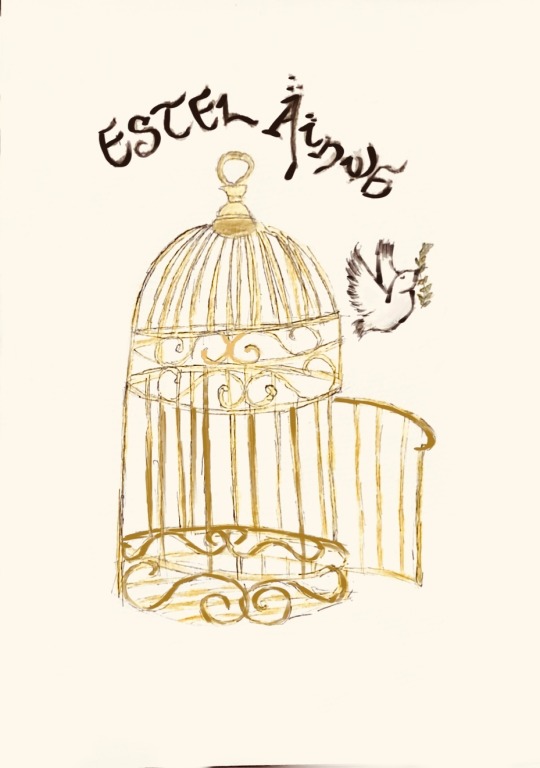
I made this for me.
#jewish biracial fairy princess me#pending graphic tag#dove + olive tree sprig#it is loosely inspired by a design on a tshirt I own that was sold to benefit charities that help child sex trafficking survivors#(I am one and I wanted to make one for me)#(also this is meant to be very jewish)#estel ainwe is also significant - hope bird in quenya + a friends OC’s name meaning that I loved
18 notes
·
View notes
Text
full on begging anti-civ people to explain just a little bit more what they mean by "destroy society" and "everything means nothing" and "civilization must end and all products of civilization" i desperately need you to clarify what you mean. those are intricate concepts that encompass vast swaths of the lived experiences of all people on earth, and it is deeply confusing.
instead of slapping down every possible idea for living more sustainably as a species, i would genuinely like to see some alternatives suggested. what do you want the future to look like? what does the "end of society" mean to you? because i feel as though the primary issue among anarchists is that no one can quite agree on what they mean by that, and what they want to see happen in the future. i struggle with it myself!
i just don't think defeatist rhetoric is very actionable, and i also think many anti-civ bloggers tend towards using nihilism to avoid engaging with the practicalities of what their philosophy is asking for - to the point where it gets rather confusing trying to figure out what, exactly, they believe the world should become in the aftermath of the destruction of civilization.
#genuinely am interested in hearing more about anti-civ beliefs#but it is difficult for me to engage in a conversation lacking clarity in the use of words#some people say 'destroy society' and mean it as 'destroy patriarchal class systems and their racializing assemblages'#and some people say 'destroy society' and mean 'society is a globalist conspiracy and must be destroyed' which is very different!#i know the second guy. i went to college with him and initially we got along bc we were both anarchists#then i found out that anarchism to him meant something very specifically white man conspiracy irt jewish people and racial minorities being#'in control' of the government in some way. he legit believes illegal immigrants are being bussed to his shitty hometown to steal jobs#but he also says things like 'we need to destroy society' and for the most part sounds like the average anti-civ anarchist on tumblr#so like i really do want to engage with the idea of anti-civilization because western civ is a poisonous concept built on conquest#i'd also just like some clarification on what yall mean by 'destroy' and also what the future should look like to all of you
4 notes
·
View notes
Text
I feel like a good amount of complaints about Mormon theology and mormon history can be explained away when you remember that in 1830: [this post is particularly about the suggestion that peoples in the Book of Mormon are Native and Indigenous American Ancestors despite being Jewish (Middle Eastern). It is also about the suggestion that Indigenous Peoples came over on boats, which stems from a racist theory purporting that Natives are actually Early europeans who traveled to the Americas on boats. Several antimormons use this to claim that Mormonism is inherently and intentionally racist.]
We didn't know about Tectonic Plates until 1915
We didn't really know about Land Bridges (or the rise and fall of the ocean due to climate change) [there were some very early theorists who were rejected by their contemporaries / didnt have enough "proof" for the bering land bridge until the 1940s and later] [the average person certainly wasn't aware of what academics at the time thought and were exploring. They were more aware of what politicians and theologians taught.]
Father of American Anthropology and really the first white Native American sympathiser, Franz Boas, is not born for another thirty years.
There was a common belief that humanity was only a few thousand years old (and didn't have much longer to live)
Darwin hadn't come up with the theory of evolution yet, and won't publish it for another 30 years.
Andrew Jackson has just started his 8 year reign of terror. Andrew Jackson pedals anti-native propaganda that becomes increasingly popular. "Manifest Destiny" and the White Man's Burden are increasingly common ideas.
Slavery in New York had just been outlawed. (1827). Some communities in New York still held slaves post outlaw [particularly non-English-American communities. If you look into Sojourner Truth's Autobiography you can see that many New York families continued to hold slaves after the law had changed.] Most white americans are still at least moderately racist.
DNA evidence was not a thing. We can't test to see how different groups are related, and a lot of [WASPs] at this time believe that people who don't share their "superior" background aren't even or are barely human.
There are many elements of early mormonism and even mormon theology that are definitely misguided, but the religion itself is not inherently or intentionally racist. It unfortunately falls into the pitfalls of many American Tenets from the same time period, particularly those relating to American Imperialism and the issue of Slavery. [There's also the pitfall that Brigham Young was a horrible person, ethically speaking] So do most other American Religions, including Adventists and Baptists.
That being said, we can't explain away modern mormon racism or how many mormon racists use symbolism in the scriptures to excuse their interpersonal racism. If you are mormon or postmormon, please fight against these ideas! Don't let your community abuse others! Speak up when the Church won't. Speak up especially when Church Leadership spreads harmful ideology.
Speak. Up. Fight Now.
#queerstake#tumblrstake#islamophobes dni#antimormons dni#antisemites dni#also for anyone asking about my credentials#currently working on a BS in Anthropology and a BA in History#Grew up interfaith mormon and jewish#have had to take several courses on human behavior and racism#and how to speak out against racism as an academic#And for clarification: while most mormons believe the scriptures are utterly true I personally believe that they are plausible at best#and a moral telling at most#i have very radical ideas though!#I dont think Joseph was lying but i dont think he was truthing either#but i dont think he meant any harm#he wasnt a charlatan#he was a product of his time
22 notes
·
View notes
Text
.
#i think A Boy mightve wanted to go home with me but unfortunately neither of us drives and i live with my dad#i feel like moving back home has turned me into an actual child#(we were having a very intense social/political/historical conversation at the oneg and then his mom who was his ride was leaving)#(and he was like nah it's cool and his mom was like what so you want [saffodils' mom] to give you a ride?)#(and i was like oh you should probably go huh and he was like yeah)#(he mightve meant nothing by it and to be fair i dont want to Do Anything but damn i would love to live in a world where)#(i can not only drive but also awkwardly talk about society/politics/history with a nice jewish boy while i am doing it)#(it is completely impractical for me to have my own place at this point: anywhere that's walkable here is expensive)#(but i miss having my own place in cincinnati and i wish i'd had more awkward conversations with nice jewish ppl there while i could)#i'm going to a passover get-together with some lgbts who are at various stages of converting to judaism or being secular but#kinda liking traditions#so. many nice jewish people are in my future#the key is i think to have good conversations with them
4 notes
·
View notes
Text
As I said I was a serial fibber as a child and one of the most ridiculous lies I told that I've never shared on here was that I pretended to be Jewish. 😭 The reason for this is that I went to school in a very diverse area of london and a majority of my schoolmates were either Hindu or Muslim, a few Christian or Sikh and I was the only one raised atheist. In Religious Education we would learn about different religions (which was good imo) and occasionally we would be asked to share something about OUR religion- which I did not have, so I felt left out and made stuff up. Initially I pretended to be Christian but decided this was too boring and "converted" to Judaism which at 7 I saw as "the other white people religion" so I could feel special while being included.
I'm ashamed to say that I A) coloured in the pictures we were given of Hannukah celebrations making all the Jewish people blonde like me B) would routinely scrawl something random on paper and tell people that was their name in Hebrew
😔 so I'd like to apologise formally to the Jewish community
#i remember my teacher that year was very devout christian and wouldnt accept that people didnt have a religion#i also got told off by her for not knowing the meaning of my name. i was like 7 lol#ALSO i didn't understand that being religious simply meant believing in a god or whatever which I DID#i thought religion meant going to a church/temple and being in a community#so I'd set challenges for myself like not steppping on pavement cracks and I'd be like 'god will love me if i do this' LMAO#also a few years ago i met another girl who pretended to be jewish as a child that was crazy#i had the mainest character syndrome as a child rip
6 notes
·
View notes
Text
It’s incredible to me how deeply Israeli propaganda and media subversion has ingrained itself into some Jewish communities in the US. I went to a school with a very large Jewish population and so many kids would tell me these harrowing stories about how their family members fled Europe in the 1940’s or how they survived. These histories and experiences really meant a lot to their identity. And then these same people are now prattling on about the importance of the Israeli state and how the Palestinians ‘did this to themselves’.
Like how?? How do you spend so much of your youth identifying with the genuinely horrifying things that happened to your family and so many others and then turn around and excuse the same atrocities when they’re happening to someone else? AND then you go after other Jewish people who don’t agree with you and alienate them from their community for standing up for what they think is right.
It genuinely makes me feel a little sick. All those experiences and values they claimed to have for so long were really just for show. None of it really means anything.
#want to be very clear that this isn’t about ‘Jewish people’ as a whole or even individuals#more that the insidious nature of Israeli misinformation and propaganda has SUCH a hold on so many American institutions#including Jewish American ones#and those who have stood up to these narratives have lost so much#it breaks my heart#but also at the same time#when so many people would say ‘never again’#they meant ‘never again…..to me’#ref rants
1 note
·
View note
Text
And people keep trying to justify Israel's existence on the basis that it is somehow a safe place for the preservation of Jewish people and their culture and not only is that an awful argument for establishing a Settler Colonist Apartheid State but it's not even true. Like the state is politically and economically dominated by Ashkenazi Jews from Northern Europe and their descendants. While not as severely mistreated as Palestinians, there is still a significant disparity between the European and Non-European Jews in terms of income and education. Non-European Jews are still regularly subject to interpersonal bigotry (hell earlier this year there was a news story about a viral video where Ashkenazi girls in a Purim made a skit mocking the Mizrahi) and Israel government policies towards non-Ashkenazi migrants have done severe damage to their social structure and cultural traditions. Not to mention the fact that the whole reason why many Mizrahi migrated in the first place was to escape the violence caused by European Jews committing atrocities in their name, tearing communities apart as neighbours that had peacefully co-existed for centuries found themselves on opposite sides of this new ethno-religious conflict
There have even been attempts in Israeli history at the forceful assimilation or even biological reduction of non-European Jews; the kidnapping and adoption of Yemeni Jewish children in the 1950s is significant example of the former while the forced contraception of Beta Israeli (Ethiopean Jewish migrants) with the explicit intention of reducing their population's birth rate is an example of the latter. There's also very clear favouritism when it comes to recent converts; white Afrikaner converts are given the right of Aliyah while Nigerian Igbos are not. Like the fact of the matter is that Israel's fundamental nature is as a European Settler Colony, incredibly racist not only towards the indigenous Palestinians but the many Non-European Jews it claims to represent. It's an outpost of Western Imperialism, not a haven for the Jewish people. If it was ever meant to be the latter than it has failed miserably
6K notes
·
View notes
Text
What i've been learning thru my research is that Lawn Culture and laws against "weeds" in America are deeply connected to anxieties about "undesirable" people.
I read this essay called "Controlling the Weed Nuisance in Turn-of-the-century American Cities" by Zachary J. S. Falck and it discusses how the late 1800's and early 1900's created ideal habitats for weeds with urban expansion, railroads, the colonization of more territory, and the like.
Around this time, laws requiring the destruction of "weeds" were passed in many American cities. These weedy plants were viewed as "filth" and literally disease-causing—in the 1880's in St. Louis, a newspaper reported that weeds infected school children with typhoid, diphtheria, and scarlet fever.
Weeds were also seen as "conducive to immorality" by promoting the presence of "tramps and idlers." People thought wild growing plants would "shelter" threatening criminals. Weeds were heavily associated with poverty and immortality. Panic about them spiked strongly after malaria and typhoid outbreaks.
To make things even wilder, one of the main weeds the legal turmoil and public anxiety centered upon was actually the sunflower. Milkweed was also a major "undesirable" weed and a major target of laws mandating the destruction of weeds.
The major explosion in weed-control law being put forth and enforced happened around 1905-1910. And I formed a hypothesis—I had this abrupt remembrance of something I studied in a history class in college. I thought to myself, I bet this coincides with a major wave of immigration to the USA.
Bingo. 1907 was the peak of European immigration. We must keep in mind that these people were not "white" in the exact way that is recognized today. From what I remember from my history classes, Eastern European people were very much feared as criminals and potential communists. Wikipedia elaborates that the Immigration Act of 1924 was meant to restrict Jewish, Slavic, and Italian people from entering the country, and that the major wave of immigration among them began in the 1890s. Almost perfectly coinciding with the "weed nuisance" panic. (The Immigration Act of 1917 also banned intellectually disabled people, gay people, anarchists, and people from Asia, except for Chinese people...who were only excluded because they were already banned since 1880.)
From this evidence, I would guess that our aesthetics and views about "weeds" emerged from the convergence of two things:
First, we were obliterating native ecosystems by colonizing them and violently displacing their caretakers, then running roughshod over them with poorly informed agricultural and horticultural techniques, as well as constructing lots of cities and railroads, creating the ideal circumstances for weeds.
Second, lots of immigrants were entering the country, and xenophobia and racism lent itself to fears of "criminals" "tramps" and other "undesirable" people, leading to a desire to forcefully impose order and push out the "Other." I am not inventing a connection—undesirable people and undesirable weeds were frequently compared in these times.
And this was at the very beginnings of the eugenics movement, wherein supposedly "inferior" and poor or racialized people were described in a manner much the same as "weeds," particularly supposedly "breeding" much faster than other people.
There is another connection that the essay doesn't bring up, but that is very clear to me. Weeds are in fact plants of the poor and of immigrants, because they are often medicinal and food plants for people on the margins, hanging out around human habitation like semi-domesticated cats around granaries in the ancient Near East.
My Appalachian ancestors ate pokeweed, Phytolacca americana. The plant is toxic, but poor people in the South would gather the plant's young leaves and boil them three times to get the poison out, then eat them as "poke salad." Pokeweed is a weed that grows readily on roadsides and in vacant lots.
In some parts of the world, it is grown as an ornamental plant for its huge, tropical-looking leaves and magenta stems. But my mom hates the stuff. "Cut that down," she says, "it makes us look like rednecks."
9K notes
·
View notes
Text
Fuck it I'm bored so here's a ranking of different Peter Parkers by how Jewish they are

Dead last, obviously, is MCU!Peter Parker. This version of Peter is the farthest from comic canon to the point of being almost unrecognizable at times. Also, Tom Holland answered the question "is peter parker Jewish" in a Wired Autocomplete Interview a while back with a very baffled "no", cementing him forever as my sworn enemy. So he's actually the only peter parker who, at least by word of God, is canonically NOT Jewish. -1000000/10
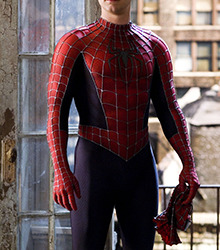
Next up is Tobey Maguire's Peter Parker. I think this Peter is... fine, at least he's much closer to comic canon than MCU!Peter, but honestly that's not saying much considering how far the MCU strayed from comic canon or even the spirit of comic canon. But like overall, Sam Raimi's movies just aren't particularly interested in presenting Peter as Jewish, so, eh. 1/10

By far the most Jewish of live action Peters is TASM!Peter, also by far the most comic accurate of live action Peters. I'd be remiss not to mention the fact that Andrew Garfield is Jewish, and he understands the character so fucking well. He stated on record that he played Peter as Jewish and that he sees Spider-Man as an inherently Jewish character:

However, the Webb movies still do not textually define him as Jewish, and the best parts of Andrew's Peter's Jewish subtext are better when viewed in light of the comics. Overall, 6.5/10
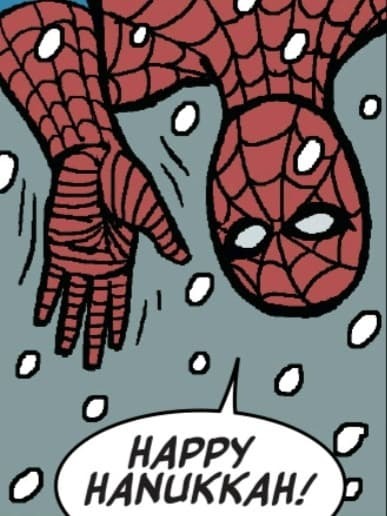
Next up is the original, our beloved comic book Peter, pictured here saying Happy Hanukkah in a panel from Matt Fraction's Hawkeye. Comic Peter is one of the most heavily Jewish coded comics characters of all time, which is saying something considering how Jewish comic books are as a medium. Obviously he was created and often written and drawn by Jewish writers and artists, but beyond that his driving ethos and values are incredibly Jewish, and as a bonus he's constantly sprinkling Yiddish and Jewish phrases into his speech, alongside things like the above panel where he outright acknowledges Jewish culture in a scene where everyone else is saying merry Christmas. However, despite the extremely heavy coding, Marvel Comics are fucking cowards, and he has yet to be confirmed Jewish, so I must give him a measly 8/10.

Finally, the cream of the crop, the most Jewish of all Peter Parkers, Into the Spider-Verse's Peter B. Parker my beloved!!! Peter B. is voiced by Jake Johnson, himself a Jewish actor, and is a phenomenally accurate representation of comic book canon - but he also has the unique quality of being canonically, textually, in the actual movie Jewish! It's a bit of a blink and you'll miss it scene, but when we get introduced to Peter B. in his "one more time" segment, we see his wedding to MJ, where he steps on a glass. This is a Jewish minhag - custom - meant to represent the destruction of our Temple and Jerusalem, as well as remind us that sorrow and joy come intertwined, and is one of my personal favorite Jewish customs. It's a phenomenal moment in the best Spider-Man movie, and while this version of Peter would have been my favorite film version regardless, his Jewishness absolutely pushes him even further up. 13/10, no complaints
#jew tag#jumblr#comics#marvel#marvel comics#spiderman#peter parker#peter b parker#spiderverse#into the spiderverse#tasm#sam raimi#the amazing spider man#mcu#gail speaks#jewish superheroes
16K notes
·
View notes
Note
How many languages do you speak?
You are always talking about alchemist that lived all around the world in very differente time periods. And you have mentioned several times that there's a ton of numerology hidden in their texts, counting syllables and letters of certain words and paragraphs. So one would assume you need to read them in the original language it was written, right?
That's a really good question! As with most really good questions, the answer is "kinda, it depends!"
So! Most alchemical texts are written in some form of coded language, but the nature of that code depends on the era and culture the text is being written in. Depending on how its written, modern scholars have a lot of different tools for cracking open alchemical esoterica.
Most ancient Greek/Byzantine texts are written in postclassical Greek. But, they're often written in dense philosophical prose. The reader needs to be familiar with the likes of Plato, Aristotle, and the early Neoplatonists, to make sense of them. Luckily for us, people have been studying postclassical Greek for nearly 2000 years. There are many excellent translations into English.
Late Egyptian alchemists wrote almost entirely in pictograph code. Not as in hieroglyphics, mind you. Egyptian alchemical recipes often made use of custom character sets and symbols that represented alchemical concepts. (One famous example, the Formula of the Crab, uses a complex diagram that looks like a centipede to represent a particular gold compound.) These are damn near impossible to read without expert help.
At the same time, Jewish and Syriac writers of the era could get by on the fact that not everyone could read Hebrew and Syriac lol. The language barrier itself acted as a sort of copyright system for protecting their ideas. Luckily for us, many of these texts were preserved and translated by medieval Arab scholars!
Speaking of Arabic, once you hit the Islamic Golden Age, the amount of alchemical literature increases by a factor of ten. Thing is, the Islamic Polymaths weren't all that interested in obscuring their work. The Islamic Golden Age was all about copying and translating older works, and compiling them into big textbook/dictionaries. They're not intentionally encoded, they're comparatively easy to read once you get a good translation. Thing is, you gotta know your Neoplatonism. Medieval Islamicate scholars love Neoplatonism.
Then we get the reintroduction of alchemy to Europe around the 10th century. What you get is about 400 years of monks painstakingly translating medieval Arabic into Latin. A lot of these texts are very well preserved, and have good translations into English.
Then, around the late 14th century, European entrepreneurial alchemy kicks into high gear, and THIS is where we get all those fancy numerology encoded alchemical texts. Renaissance alchemists loved themselves some puzzles. This would be fine if they were all just writing in Latin, but the printing press meant they could write in any damn language they please. You get a lot of French, German, Dutch, Italian, and antiquated English alchemical texts, and they can be a bitch to read without help.
BUT the introduction of the printing press also gave us something useful: cheap picture books! Late renaissance alchemists loved writing in word games and coded metaphor, but they also loved including esoteric diagrams. And the thing about esoteric diagrams is --if you know your stuff-- you don't need to speak 15th century french to read a picture. Which isn't a replacement for reading the original translation, not even close, but the explicit purpose of these images was to prove to other alchemists that the author knows what they're talking about. So if you can read them, you can get a damn good sense as to what the text is about.
This was fun to write so I'm gonna plug my patreon if you wanna see me write more about alchemy.
2K notes
·
View notes
Text
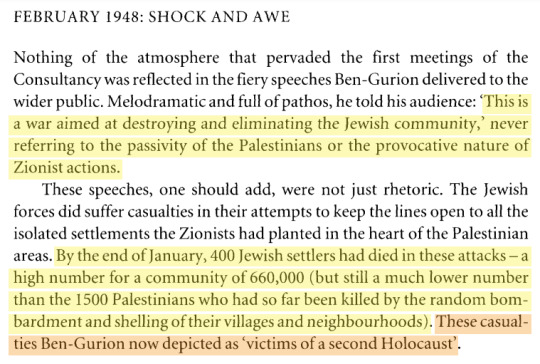
The Ethnic Cleansing of Palestine, by Ilan Pappé (2006, p. 72)
The rhetoric from Israel and their defenders really hasn't changed one bit, has it? Months and months of terrorizing Palestinian villages, and the moment they retaliate, it must be because the Arabs are violent Nazis set to exterminate the oh-so-peaceful Zionist settlers for no other reason than them being Jewish
And what were the Zionists settlers - with Ben-Gurion's explicit approval - doing at the time?

Pappé (2006, p. 58)
Similarly, in the villages:

Pappé (2006, p. 57)
Still the same playbook, 75+ years later...
Also, it's important to understand that these violent attacks against Palestinian cities and villages - and there were many more in the winter of 47/48 than the examples included here - were part of a larger, deliberate operation meant to 'drive out' (i.e. ethnically cleanse) the Native population of Palestine. It didn't matter if the Palestinians were just quietly living their life in the countryside; if they were not Jewish, they would had to go. And if the Zionists could not find a pretext for retaliation, they would make one.
In the aftermath of the UN partition, this operation of ethnic cleansing - without 'pretext' - was not only openly discussed, but approved of, by Ben-Gurion and the rest of the Zionist leadership:
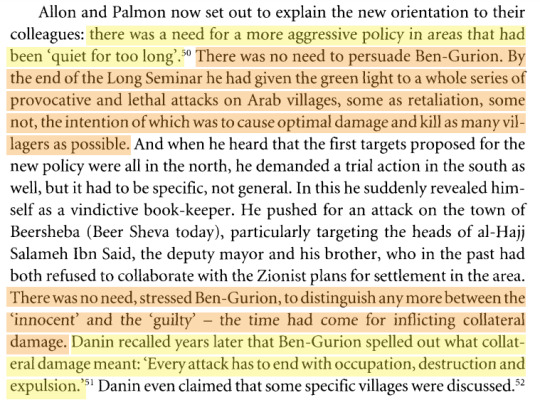
Pappé (2006, p. 64)
What we're seeing today in Gaza - with the collective punishment of 2 million Palestinians - is the continuation of this very same Zionist program of ethnic cleansing that Israel was founded on.
#free palestine#palestine#gaza#these are all quotes from ch. 4#which deals with the immediate aftermath of the UN partition#starting now on chapter 5 of my rereading#and once again i encourage everyone to read along with me#if you can't afford to buy it there's always libgen (or google author + title + pdf and a copy should come up)
2K notes
·
View notes
Text
Had to explain to three secular anti-Zionist Jew friends from back home (Philly area) that the definition of Zionism they were being fed and using was actually Kahanism.
The collective silence that fell in our chat, followed by the group going “oh, I didn’t know that…” was audible.
All three of them have lived comfortably in an area that has a very large Jewish population and a lot of Jewish culture integrated into it. But they don’t know their own local history, let alone the history, ideologies, and other important things of their people. I don’t fault them for this, because not everyone is diving into the history of a given thing.
But this was after they each said they couldn’t talk to their family anymore because they were Zionists, and that meant they were racists supporting genocide.
The tone completely shifted as they realized that they had been manipulated and misinformed to view their families and other Jews as “evil” people.
I then hit them with the revelation that the “Zionism = Racism” thing was a cooperative move from the Soviets and a Nazi inspired Syrian party in the 60s and 70s.
That caused a collective sharp intake of breath and an “oh, fuck”.
Hopefully they take this newfound knowledge and make good on it. I also know I only had an impact because, once again, I’m a trusted friend who is also trusted to educate with sources to back me up.
#jumblr#i/p misinformation#Even our own people can be misinformed about stuff relating to us#misinformed#Most people mean Kahanism when they talk about Zionism
449 notes
·
View notes
Text
It’s just really strange that most conspiracy theories hinge on elusive human trafficking rings or insanely powerful global groups or whatever leaving little cute breadcrumb trails along the way for you to find like life is just a Blue Clues episode
#conspiracy theories#human trafficking tw#cabal tw#like idk why you think they’d make their name an anagram for kill minorities or whatever#these groups that actually exist also don’t even try to hide their racism or antisemitism or misogyny#like the literal questions they ask are how do you feel about Jews or how do you feel about women etc#maybe it’s cause I’m Jewish but the idea of conspiracy theories as anything but pure fun on the internet just feels very cult like#almost in the way it’s meant to distract you from what’s actually happening#many many entertainment companies exploit children still#many many companies actively try to enact laws that make it harder for POC in the us to be above the poverty line#these aren’t things that are hidden#they are in plain sight#it’s not wayfair having a bad naming convention on storage containers#it’s managers and doctors and shit being very open about their abuse
0 notes
Text
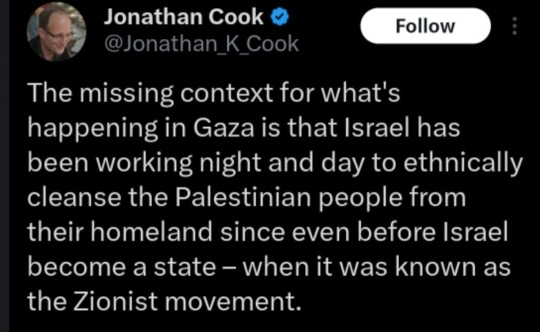
Copied from the OG Tweet as it's too long to screenshot. Source is @Jonathan_K_Cook on Twitter:
The missing context for what's happening in Gaza is that Israel has been working night and day to ethnically cleanse the Palestinian people from their homeland since even before Israel become a state – when it was known as the Zionist movement.
Israel didn't just cleanse Palestinians in 1948, when it was founded as a Western colonial project, and again under cover of a regional war in 1967.
It also worked to ethnically cleanse Palestinians every day between those dates and afterwards. The aim was to move them off their historic lands, and either expel them beyond Israel’s new, expanded borders or concentrate them into small ghettoes inside those borders – as a holding measure until they could be expelled outside the borders.
The 'settler' project, as we call it, is a misnomer. It's really Israel's ethnic cleansing programme. Israel even has a special word for it in Hebrew: 'Judaisation', or making the land Jewish. It is official government policy.
Gaza was the largest of the Palestinian reservations created by Israel's ethnic cleansing programme, and the most overcrowded. To stop the inhabitants spilling out, Israel built a fence-barrier in the early 1990s to pen them in. Then when policing became too hard from within the prison, Israel pulled back in 2005 to the outer perimeter barrier.
New technology allowed Israel to besiege Gaza remotely by land, sea and air in 2007, limiting the entry of food and vital items like medicine and cement for construction. Automated gun towers shot anyone who came near the fence. The navy patrolled the sea, stopping boats straying more than a kilometre or two off shore. And drones watched 24 hours a day from the sky.
The people of Gaza were sealed in and largely forgotten, except when they lobbed a few rockets over the fence – to international indignation. If they fired too many rockets, Israel bombed them mercilessly and occasionally launched a ground invasion. The rocket threat was increasingly neutralised by a rocket interception system, paid for by the US, called Iron Dome.
Palestinians tried to be more inventive in finding ways to break out of their prison. They built tunnels. But Israel found ways to identify those that ran close to the fence and destroyed them.
Palestinians tried to get attention by protesting en masse at the fence. Israeli snipers were ordered to shoot them in the legs, leading to thousands of amputees. The 'deterrence' seemed to work.
Israel could once again sit back and let the Palestinians rot in Gaza. 'Quiet' had been restored.
Until, that is, last weekend when Hamas broke out briefly and ran amok, killing civilians and soldiers alike.
So Israel now needs a new policy.
It looks like the ethnic cleansing programme is being applied to Gaza anew. The half of the population in the enclave's north is being herded south, where there are not the resources to cope with them. And even if there were, Israel has cut off food, water and power to everyone in Gaza.
The enclave is quickly becoming a pressure cooker. The pressure is meant to build on Egypt to allow the Palestinians entry into Sinai on 'humanitarian' grounds.
Whatever the media are telling you, the 'conflict' – that is, Israel's cleansing programme – started long before Hamas appeared on the scene. In fact, Hamas emerged very late, as the predictable response to Israel's violent colonisation project.
Israel could once again sit back and let the Palestinians rot in Gaza. 'Quiet' had been restored.
Ignore the fake news. Israel isn't defending itself. It's enforcing its right to continue ethnically cleansing Palestinians.
#gaza#free gaza#gaza strip#palestine#free palestine#news on gaza#irish solidarity with palestine#al jazeera
759 notes
·
View notes
Text
by POTKIN AZARMEHR
‘Pro-Palestine’ protests have become a near-weekly occurrence across Britain. Since Hamas’s 7 October massacre, regular marches have been drawing in a growing number of young people, marked by passionate advocacy and fervent slogans. Yet despite their zeal, many of these protesters lack a fundamental understanding of the conflict they are so vociferously decrying.
In the past six months, I have attended many of these marches. Having engaged with numerous protesters, I have noticed a startling disconnect between their strong opinions on the Gaza conflict and their shaky grasp of basic facts about it. Among the most perplexing are the LGBT and feminist groups (the ‘Queers for Palestine’ types) who flirt with justifying Hamas’s atrocities. This is a bewildering alliance, given that Hamas’s Islamist ideology is clearly antithetical to the rights and values these groups claim to champion. Its reactionary agenda is profoundly hostile to women’s rights and LGBT individuals.
Protesters seem eager to make excuses for Hamas, but are conspicuously uninformed about exactly what or who this terrorist group represents. On 18 May, during a protest at Piccadilly Circus in London, I spoke to demonstrators who firmly believed that Hamas represents all Palestinians. When I questioned a well-educated participant about the last Palestinian election, she was unaware that none had occurred since 2006, when Hamas gained power in Gaza.
It wasn’t just young people who were uninformed. An older woman with an American accent, seemingly a veteran protester, admitted she knew that Hamas was linked to the Muslim Brotherhood, but had no deeper knowledge of its ideology or history. Others, such as members of revolutionary socialist groups, displayed similar gaps in understanding, unaware of critical events like the 1979 Iranian Revolution.
That revolution gave birth to the Islamic Republic of Iran, a theocratic regime that brutally oppresses its own citizens. It also sponsors Islamist groups like Hamas. I left Iran for the UK not long after that regime began and have spent years resisting its religious extremism and ruthless political intolerance. Protesters were not only unaware of these facts about the Iranian regime, but also ill-informed about the struggle against it, such as the ‘Woman, Life, Freedom’ protests against the government that began in 2022.
One particularly telling conversation involved a man advocating for a ‘Global Intifada’ to replace capitalism with socialism. When asked about successful socialist models, he was unfamiliar with the Israeli kibbutzim, one of history’s few successful egalitarian experiments. His ignorance of these communal settlements in Israel, built by socialist Jewish immigrants, was all too typical.
Perhaps the most telling moment was captured by commentator Konstantin Kisin earlier this year, when he encountered a young man holding a ‘Socialist Intifada’ placard. The protester admitted he had no idea what this meant and that he had taken the sign simply because it was handed to him.
Reflecting on past movements, such as the American anti-Vietnam War protests of the 1960s and the British Anti-Apartheid Movement of the 1980s, one can’t help but note a stark contrast. Protesters then were generally well-informed about their causes. Today’s pro-Palestine protests, however, seem to be driven more by unthinking fervour than by an understanding of the issues at hand.
Throughout all these protests, I am yet to encounter a single participant who condemns Hamas or carries a placard denouncing its terrorism. This not only undermines the protesters’ cause, but also risks aligning them with groups whose values fundamentally oppose the very rights and freedoms they claim to support. It appears that today’s young protesters are high on ideology, but woefully thin on facts.
Potkin Azarmehr is an Iranian activist and journalist who left Iran for the UK after the revolution of 1979.
273 notes
·
View notes
Text
Every year at about this time (...very approximately) I post a reclist of 10 short stories I particularly enjoyed reading in the last year, all of which can be read online for free. Here's the latest list, and I hope you enjoy them as much as I did!
1. Sestu Hunts the Last Deer in Heaven - MH Cheung
Beautiful and odd. A story of what happens after you've killed the gods, the unexpected realities and the things you have to live with. I love stories about after the climactic things traditional fantasy narratives are about, and this one excels!
2. If You Find Yourself Speaking to God, Address God with the Informal You - John Chu
Two butch Asian weightlifter dudes bonding with each other and then dating, and one of them happens to have superpowers, but the superpowers aren't the focus. This is SO charming!!
3. Two Hands, Wrapped in Gold - SB Divya
This is a really cool retelling of the classic fairy tale Rumpelstiltskin from the Rumpelstiltskin character's pov, building out the world and his background and making him a sympathetic character with a specific history. Haven't seen a fairy tale retelling quite like this before and it's great! And I say that as a connoisseur of fairy tale retellings.
4. A Farce to Suit the New Girl - Rebecca Fraimow
A troupe of Jewish actors in Russia, in a time of political upheaval. This story has such a good and powerful feeling of activity and forward momentum, and of the way a community supports people even if things are weird or complicated! I love every single character and how firmly they are themselves.
5. Sheri, At This Very Moment - Bianca Sayan
The sacrifices you make to spend time with the ones you love - a snapshot of one brief visit together, out of two lives that only rarely get to align. Made me teary the first time I read it!
6. Spirochete - Anneke Schwob
An engaging second-person pov story about possession and identity. It has such a great sense of timing! And the last line GOT me even on second read when I hypothetically knew what was coming!
7. To Embody a Wildfire Starting - Iona Datt Sharma
Ahhhhhh this story is so good at embodying the horrible complexities of the choices people make in the worst of situations, that good and bad and divine and evil and just plain personness can all reside in one being. Also it's about a dragon society and the revolutionary humans who tried to make everyone into dragons, and also about parent-child relationships, and also about a bunch of other things. God it's good.
8. Obsolesce - Nadine Aurora Tabing
Is it really me if I don't have at least ONE story about robots in my rec lists? (actually I just went back and checked and in multiple previous years I inexplicably didn't, maybe it wasn't me writing the reclist in those years lol) ANYWAY who wants to have sad feelings about robots again! I know I always do! In a world where anyone who has a physical body instead of having their consciousness transferred is more and more obsolete, no matter if your body is human or robot, what do you hold onto? This one has a real good melancholy tone.
9. Letters from a Travelling Man - WJ Tattersdill
....does what it says on the tin. Letters to a dear friend, from a man travelling for the first time to the unfamiliar part of the world that friend comes from. I love the sense of place you get from the letters, as well as the deep and abiding importance of this friendship in both their lives. Another one I cried over!
10. Texts from the Ghost War - Alex Yuschik
Another epistolary one, but this time in text messages instead of letters, and between characters who start the story antagonistically! About mech pilots in a ghost war, and making connections, and finding things to care about, even when stuff sucks. I love them!! (also, I am inescapably me, whoops, it took me until I read some fanfic of this story to realize that almost certainly the story was meant to be canonically shipping the two leads, I never notice romance unless there's anvil-sized indications.) Anyway this is a really good story!
4K notes
·
View notes